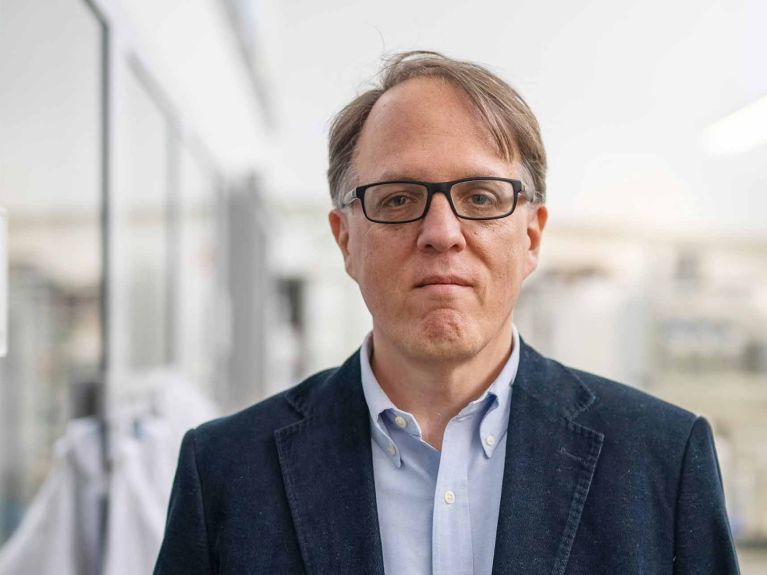Attractive to researchers worldwide
Germany offers a wide range of opportunities for international researchers – thanks in part to the guaranteed freedom of research.

The US researcher Peter N. Robinson is considered a pioneer in computer-assisted genome and phenotype analysis, something that is especially useful in diagnosing hereditary diseases. Robinson compiled his findings in a database that links specific symptoms directly to gene mutations. So far, it contains 13,000 such traits. This “Human Phenotype Ontology” (HPO) has come to be recognised internationally as a standard tool for diagnosing genetic conditions.

Robinson has since left his home country, the US. In 2024, he received an Alexander von Humboldt-Professorship and moved from the Jackson Laboratory for Genomic Medicine in Farmington, Connecticut, to the Berlin Institute of Health (BIH) at Charité. Germany’s most highly endowed research award, worth five million euros, the Humboldt Professorship helps attract leading international researchers to German universities . Robinson plans to use his position to develop algorithms for AI-based precision medicine. “We want to test and further develop artificial intelligence and algorithms in practical settings – something that’s relatively easy to do here at the BIH as part of Charité,” he says.
German universities among the best in the world
Peter N. Robinson is one of more than 75,000 researchers from around the world working in Germany. For international researchers and students alike, Germany is one of the most attractive destinations. The research output of Germany’s more than 400 higher education institutions is excellent. In cutting-edge fields such as artificial intelligence, mathematics, medicine and environmental science, German universities rank among the best worldwide. They are regularly placed in top positions in international rankings.
According to the study Wissenschaft weltoffen 2024 by the German Academic Exchange Service (DAAD), Germany is the second most important host country for international researchers – behind only the US. In the winter semester 2024/25, almost 493,000 international students were enrolled at German universities – a new record. This means international students now make up almost 17 per cent of the student population. “These trends underline Germany’s appeal as a centre for research and study – based above all on the high quality of its universities and research institutions and their strong international networks,” says DAAD President Prof. Dr. Joybrato Mukherjee. Dr. Joybrato Mukherjee.
AI talent for Germany

For young AI researcher Molly Kennedy, it was the mix of strong research and work opportunities, high quality of life and academic freedom that led her from Northern Ireland to Germany. She specialises in linguistics and computer science and is looking to improve how error-proneness in large AI models is managed. At the DAAD-funded Konrad Zuse School for Excellence in Reliable AI at LMU Munich, she has found ideal conditions for her work.
Right now, the chances I’ll stay are pretty high.
Three Zuse Schools – located in Darmstadt, Dresden and Munich – offer international talent like Kennedy a combination of top-level academic training and internships with well-known companies. Kennedy is already in contact with SAP and Infineon. “Germany is attractive to me for a whole range of reasons – good career prospects, excellent quality of life and a great deal of academic freedom,” says Kennedy. “Right now, the chances I’ll stay are pretty high.”
relAI organises retreats and events across Germany that offer the chance to discover new places, connect across disciplines and meet other researchers. I especially enjoyed meeting fellow students and learning about the exciting work being done in various AI fields.
English-language programmes, no tuition fees
Alongside the DAAD and the Alexander von Humboldt Foundation, the German Research Foundation also offers a wide range of funding opportunities for international researchers. Overall, Germany’s research environment compares very favourably internationally. This is also reflected in the figures – in 2023 alone, nearly 130 billion euros were invested in research and development, up seven percent on the previous year. That’s 3.1 percent of Germany’s GDP. Companies accounted for the largest share of this, at 88.7 billion euros. Another plus is the steady growth in English-language degree programmes, which make it easier for international talent to get started. According to the German Rectors’ Conference, German universities now offer more than 2,000 English-language courses – about ten percent of the total. Another argument in favour of studying in Germany is that most universities charge very low tuition fees or so-called semester contributions – or none at all. This is because the federal states provide the core funding for public universities.
Comprehensive information about suitable study programmes in Germany is available via the DAAD’s interactive MyGUIDE platform. Students from more than 130 countries can use it to check whether their qualifications meet the requirements for studying in Germany – and, based on their education and preferences, find the right degree programme.
Highest retention rate worldwide
Germany has every reason to welcome international researchers with open arms. Every new cohort of international students contributes to the country’s economic output: that’s the finding of a study by the German Economic Institute (IW) on behalf of the DAAD. “Investing in the education of international students strengthens the pool of skilled workers and, in the long term, supports economic growth in Germany. It also helps meet the challenges of demographic change,” says IW Director Michael Hüther. Germany’s next federal government has already announced plans to maintain the country’s position as an attractive destination and safe haven for academic freedom – with new funding programmes aimed at attracting international talent.
Germany’s appeal for international students is also clear from figures provided by the Organisation for Economic Co-operation and Development (OECD). Together with Canada, Germany has the world’s highest retention rate of international students – ten years after starting their studies, 45 percent are still in the country. Germany is also becoming increasingly attractive to international researchers for another reason: more and more top scientists around the world are facing restrictions on academic freedom, which in Germany is guaranteed under the constitution.


